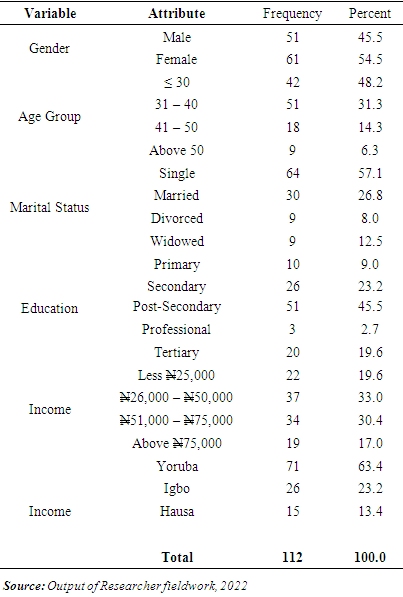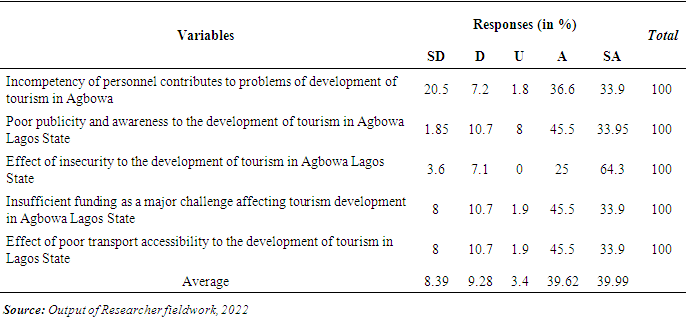-
Paper Information
- Paper Submission
-
Journal Information
- About This Journal
- Editorial Board
- Current Issue
- Archive
- Author Guidelines
- Contact Us
American Journal of Tourism Management
p-ISSN: 2326-0637 e-ISSN: 2326-0645
2023; 12(1): 1-9
doi:10.5923/j.tourism.20231201.01
Received: Feb. 1, 2023; Accepted: Feb. 16, 2023; Published: Mar. 15, 2023

Unveiling the Dilemma of Sustainable Tourism Development in Nigeria: A Study of Agbowa, Ikorodu, Lagos State
Olumide Olusola Metilelu1, Adekanbi Oluwafemi Omodehin2, Olajide F. O. Salako3, Matthew Iwada Ekum4
1Department of Hospitality Management, Lagos State University of Science & Technology, Ikorodu, Lagos State
2Department of Geography and Regional Planning, Olabisi Onabanjo University, Ago-Iwoye, Ogun State
3Department of Transportation Planning and Management, The Federal Polytechnic Ilaro, Ilaro, Ogun State
4Department of Mathematical Sciences, Lagos State University of Science & Technology, Ikorodu, Lagos State
Correspondence to: Olumide Olusola Metilelu, Department of Hospitality Management, Lagos State University of Science & Technology, Ikorodu, Lagos State.
| Email: |  |
Copyright © 2023 The Author(s). Published by Scientific & Academic Publishing.
This work is licensed under the Creative Commons Attribution International License (CC BY).
http://creativecommons.org/licenses/by/4.0/

Tourism generally is about the movement of people from one location to another, it is essentially a movement for the purpose of recreation or socialization. Agbowa is one of the major towns in the Ikorodu area of Lagos State that is rich and endowed with a sizeable number of tourists’ destination sites, activities and programs, which therefore provide a great opportunity for tourism development which is an attempt to further complement other economic, social, environmental related available job opportunity. Thus, this article aimed at unveiling the dilemma of tourism development in Nigeria and proffer possible solutions, using Agbowa locality of Ikorodu, Lagos as special case. To unveil these dilemmas, data was collected from 120 respondents using the questionnaire method to elicit sustainable tourism development data from the perception of respondents. Accidental sampling technique was used to administer the 120 questionnaires in order to achieve the objectives of the study from respondents (visitors and residents) and analyzed using descriptive statistics. The findings emanating from the study identified poor funding, low publicity, poor quality of personnel, lackluster transport service, and security as constraints are the major dilemmas affecting sustainable tourism development in the host community. The study therefore recommended that there is need to encourage public private partnership (PPP); increasing publicity and awareness; improve security and safety and provision of good accommodation and transportation. The study concluded that with the public involvement and private sector participation and the provision of enabling environment, sustainable tourism development can be achieved in Agbowa township of Ikorodu, Lagos State, Nigeria.
Keywords: Tourism, Sustainable, Development, Agbowa, Ikorodu, Nigeria
Cite this paper: Olumide Olusola Metilelu, Adekanbi Oluwafemi Omodehin, Olajide F. O. Salako, Matthew Iwada Ekum, Unveiling the Dilemma of Sustainable Tourism Development in Nigeria: A Study of Agbowa, Ikorodu, Lagos State, American Journal of Tourism Management, Vol. 12 No. 1, 2023, pp. 1-9. doi: 10.5923/j.tourism.20231201.01.
Article Outline
1. Introduction
- Historically, tourism industry is as old as the history of man. It became prominent during the industrial revolution in which a growing number of people found themselves with both the money and travel time to visit different places for religion, recreation, and of course the discovery about other lands, people and culture (Jiboku & Jiboku, 2010). More implicitly, the World Tourism Organization report shows that tourism serves as the driving force for sustainable development because it accounted for 11% of global employment and about 100,000 new jobs are created (skilled and semi-skilled) for young people annually in tourism industry. Tourism is imbued with socio-cultural activities which can unanimously serve as vital ingredients for socio-economic transformation in host and local communities if properly harnessed. This assertion is true since tourism involves organized travelling of a person or group of persons with socio-economic potentials to resource centres outside their usual place of residence for leisure, discovery, educational development and business (WTO, 2008; Camilleri, 2018). Further, tourism is a desideratum to sustainable development. Developed countries of the world have harnessed tourism to their advantage as a source of revenue generation. Some North African countries like Algeria, Egypt and East African countries like Botswana, Tanzania and Kenya accepted the challenge of international tourism, and now reaping the socio-economic benefits of tourism development. In Nigeria, tourism resources have been underutilized, which is traceable to the low economic structure and bad governance. However, Nigeria is very rich in ecological and cultural resources. Nigeria has a wide variety of biodiversity, blessed with cultural and traditional festivals. The relevance of this study is in the fact that despite the huge tourism resources in Agbowa, the level of tourist inflow is not encouraging. On this note, the study aim is to unveil the dilemmas of sustainable tourism development in Agbowa township, Lagos State, Nigeria. However, the specific objectives are to, Identify major problems confronting development of tourism in the study area, also to examine the extent at which the identified problems affect tourism in the study area and to proffer recommendations and strategies towards improving tourism development in Agbowa.
2. Statement of Problem
- The Millennium Development Goal (MDG) targeted at 2015 came and past without achieving the goals in Nigeria, especially in the area of tourism; although, significant progress was recorded in some areas like Calabar, Nigeria. Nigeria did not achieve the MDG 2015 due to some dilemmas, such as, bureaucracy, poor resource management, kidnappings, etc. The country needs to tackle these dilemmas to be able her achieve the Sustainable Development Goals (SDGs) targeted at 2030. One of the SDG agenda is aimed at devising and implementing policies to promote sustainable tourism that creates jobs and promotes local culture and products. This goal is further highlighted with the aim of developing and implementing tools to monitor sustainable development impacts for sustainable tourism that creates jobs and promotes local culture and products. Tourism is seen as one of the major tools that will be used to increase the economic benefits of small localities like Agbowa in Lagos State of Nigeria in particular and developing countries in general.In spite of huge social, economic and cultural potentials associated with tourist activities, Nigeria is yet to fully harness her tourism industry for the realization of predetermine developmental goals. This situation has become a great concern for scholars and academicians who have engaged themselves in several researches on how to achieve SDGs on tourism development through the tourism industry in Nigeria. Literature shows that the tourism sector in Nigeria have been confronted with various dilemmas, such as, lacking political will to make informed policies, corruption of politicians and nonpoliticians, poor financial management, poverty of the masses, lack of adequate infrastructure, etc. However, only few studies addressed the issues of creating awareness on the importance of private participation in tourism development in the host communities. Furthermore, neglecting tourism industry for oil, telecommunication and agriculture industry has been attributed to mono-economy system or poor diversification of the source of revenue and lack of know-how to develop and exploit the national assets and our values of overdependence on the earlier traditional source of revenue. Hence, it is pertinent with empirical work of this nature to identify tourism assets that are little known nationally and internationally for the purpose of building formidable tourism industry for sustainable development in Agbowa, Lagos State, Nigeria. Moreover, reports have shown that the range and number of cultural festivals and events in Agbowa, Nigeria can be a potentially marketable product but lack some strategic improvement to make them marketable in the context of modern society. Equally, earlier also research works have clearly shown that many of Nigeria's historic sites are in dilapidated states which hinder the adoption of a niche marketing approach. Thus, it is key to examine respondents’ perception on how best to rejuvenate places of tourist attractions in order to meet international standards as well as to assist in designing a robust regulatory legislation in Nigeria. In order to achieve the SDGs targeted at 2030 on sustainable tourism development, it is therefore, imperative for this study to unveil the dilemma of tourism development in Nigeria.
3. Empirical Review
- The need for effective tourism industry has gradually assumed center stage in Nigeria's developmental agenda in order to achieve the bigger picture of the SDGs targeted at sustainable tourism development and how it can impact on the economy. Ikporukpo (1993) observed that culture diversity in Nigeria provides a good setting to showcase the various cultural heritage as tourism products to the international communities. Theobald (2005) construe tourism as the movement of people from one place to another in the act of traveling which does not lead to permanent residence. Thus, tourists must be provided with tourist facilities such as visiting places of attractions making use of accommodation, transportation, entertainment and restaurants that will make their stay worthwhile and interesting. Similarly, Abegunde et al. (2007) conceived tourism as the act of travel for the purpose of recreation and business, and the provision of services for this act. Studies conducted on Nigeria’s tourism industry performance revealed that a number of structural problems hinder government efforts to achieve sustainable tourism development. Holden (2008) noted that ‘tourism has huge potentials for driving developing economies toward achieving MGDs' this informed the renaissance of tourism industry in some developing countries including Nigeria. In the same vein, the United World Tourism Organization (UNWTD) strongly believe that with the vast socio-economic potentials for employment creation, capacity to disburse socio-economic benefits to all levels of society in developing countries, tourism can construe as the undisputed weapon of war against poverty. In a study conducted by Ayeni et al. (2009), it was revealed that Nigeria's tourism industry is bedeviled with numerous problems and prominent among these are the dearth of tourism infrastructure, landscape and supporting institutions. Payne & Mervar (2010) assert that tourism is more of a social phenomenon, which has helped countries (developed, emerging and developing ones) to benefit from social contact (occasional or frequent) that in turn led to the development of social ties, acculturation and national economic growth. However, in Nigeria, the industry is yet to meet up with these expectations and outcomes for sustainable development. Study carried out by Anatusi & Nnabuko (2010) revealed that corruption, underdevelopment, poverty and lack of modern facilities as well as lack of insufficient accommodation in some parts of the country made it difficult for international and local tourists investors to tap the richness and diversity of Nigeria's tourism resources. It is important to note that tourism is one of the programs that ranks high in the contribution to economic advancement. In this sense, tourism serves as the engine for development of Nigeria’s economy, if well developed and sustained (Da'silva, 1985; Atewologun; 1986 cited in Dalat, 2010). Scholars have proved beyond reasonable doubt that tourism has become a major alternative form of commodity export and a significant source of foreign exchange that allows internal and external trade balance to be reconciled for efficient, social and economic outcomes (Adora, 2010; Jiboku and Jiboku, 2010; Adedoyin, et al., 2011). Moreover, Liu & Ko (2011) affirmed that attributes such as the quality of the landscape, the diversity of wildlife, flora and fauna, the historic and cultural features which inform what you see in the natural environment, everyday activities and expenditure experiences are crucial elements in building tourism industry that will attract tourists within and outside the national boundary. It is through this that the proceeds from tourism translates into quality life, cultural integration, aesthetic and social-economic growth. Also, they assert that the ability to reconcile both internal and external trade determines the level of development which the government can achieve for the populace. No doubt, this inform tourism development as a very important sector of emerging economies with the fundamental assumption that tourism has multiplier effects across all gamut of the society particularly in creating employment opportunities. Nevertheless, tourism is defined as a composite of activities, services, and industries that delivers a travel experience to individuals and groups travelling fifty miles (about eighty kilometres) or more from their homes for purposes of pleasure. Similarly, Seetanah et al. (2011) studies and presented how far tourism infrastructure, income of tourists, distance and relative prices have influenced the extent of international tourist arrivals in Mauritius and concluded that infrastructure positively affect local and international tourist arrivals to the host communities. Meanwhile, tourism is discovered as a crucial tool for poverty alleviation, attainment of the MDGs and sustainable development (Olorunfemi & Raheem, 2008 cited in Tunde, 2012). Furthermore, tourism allows wealth creation in the host community in various ways. The major importance of tourism industry is that it is labour intensive extremely, and most businesses that operate within it are both macro and micro operators. This implies that any investment injected into the tourism industry has direct impact on business owners and other stakeholders, and it is directly proportional to boosting local spending, and increase the progress of achieving the SDGs targeted at 2030 on sustainable tourism development. Akpan & Obang (2012) opined that recently, many states and the federal government have recognized the socio-economic benefits of tourism development to national growth, thus, diversifying the economy to develop tourism. Ojo (2014) opined that tourism impacts socio-economic development positively, and suggested that tourism sector can be strengthened through public-private-partnership to attract international visitors to Nigeria. Esu (2015) opined that skills and attitudes gained by entrepreneurs have positive effects on the development of tourist needs, and it also depends on the quantity and quality of entrepreneurship the country possesses. Amalare et al. (2020a) opined that GDP and CPI can be used as economic growth variables to measure the growth rate of Nigeria’s economic and for making policy. Khan et al. (2020) opined that policy-makers should be aware that tourism can developed through public interventions by the design and implementation of integrated policies in developing economies. Amalare et al. (2020b) opined that tourism should be driven by private sector; and that most of the tourist attractions in the localities of Ibadan have been abandoned, but if revamped would definitely develop the quality of life in the study area. Their studies concluded that if tourist attractions are identified with private participation, host communities would generate more income and create job opportunities. Metilelu et al. (2021) in their study mentioned that recreation and physical activities are ways tourists maintain healthy lifestyle, and recreational parks provide such avenue. Metilelu & Olasokan (2021) mentioned that tourism, which addresses the needs of the visitors, industry, environment and the host communities and takes account of economic, social and environmental impact, is referred to as sustainable tourism. Metilelu et al. (2022a) mentioned that tourism has gained much recognition in Nigeria, which could caused by environmental pollution.Wijesekara et al. (2022) found that in most localities, tourism impacts significantly on the growth of the economy and vice versa. Metilelu et al. (2022b) recommended in their work that investors should establish more nature base recreational centres in Ikorodu to meet the demand for sustainable tourism development. Thus, in order to fill the gap identified in previous studies and to make progress in achieving the 2030 SDGs on sustainable tourism development, This study therefore attempt to unveil the dilemmas affecting Nigeria’s tourism development, using Agbowa, Ikorodu, Lagos State, Nigeria as a special case. The study would be very useful to government functionaries in the area of tourism development. Private sectors would know the aspect of tourism to invest in, host communities would know the tourism product to market, tourists awareness of tourism resources available in Agbowa localities, all stakeholders and non-governmental organizations (NGOs) would know the major dilemmas that have been unveiled and know how to prevent and tackle these identified challenges.
4. Study Area and Methodology
4.1. Study Area
- Lagos State, Nigeria tourism resources can be grouped into man-made, natural, cultural and religious respectively. The main tourist attractions in Agbowa, Ikorodu of Lagos State, Nigeria include cultural, historical, natural and several other man-made resources. Figure 1 shows that Agbowa is located along the Ikorodu – Itoikin road, the town Is situated within the Agbowa / Ejinrin district of Epe Local Government area. Its boundary extends westward to Imota, Isiu and Ikorodu Eastward to Ajebo, Orugbo and Itokin, Southwards to Ado, Ikosi beach. It is bounded in the North by Lagos lagoon. Agbowa is a town located on a slightly elevated land south lies a shelter lagoon behind which is a mangrove swamp forest. Agbowa-Ikosi is bounded in the north by Epe, on the south by a creek that extends parallel to the sea from Lagos to Ikorodu. Agbowa has a mixed heritage of indigenes and non-indigenes. The localities around Agbowa can be seen on the map depicted in Figure 1. Agbowa indigenes are predominantly fishermen, while some are farmers. The drainage system of the area is characterized by the Ikosi beach, sunwo salabo stream.
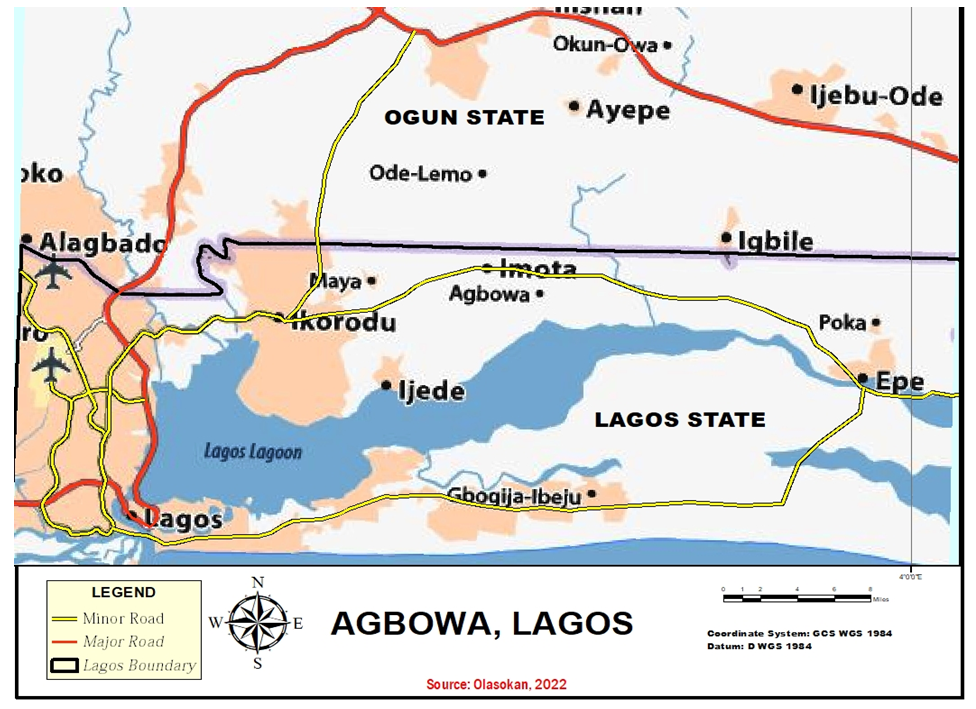 | Figure 1. Map of the study area |
4.2. Methodology
- This study adopted descriptive survey design in which primary data sources were used. The primary data was gathered through a self-developed questionnaire collected from 120 respondents using a non-probability sampling technique called accidental sampling technique. The items contained in the questionnaire were generated from literatures. The validity and reliability of the questionnaire revealed a Cronbach’s alpha of 8.79, which shows that the instrument is reliable and consistent for the study. Based on the 2006 census, Agbowa population was estimated to be 107,283. One hundred and twenty (120) questionnaires were administered out of which 112 questionnaires were retrieved and use for data analysis. Moreover, the nature of the study enhance the use of accidental sampling methods which was used to select 120 respondents who reside in Agbowa, Ikorodu, Lagos State, Nigeria. The respondents were selected from different location within the study area in order to accommodate the heterogeneous nature of the study.
5. Results and Discussion
5.1. Analysis of Socio-Demographic Information of Respondents on Tourist Users
- Table 1 shows that 45.5% of the users of tourist attraction in the study area who responded to this study are male while 54.5% are female which indicated that female patronize tourist centre in Agbowa (study area) than male (Table 1). This study shows that 48.2% of the respondents are below 30 years old; 31.3% are between 31 and 40 years; 14.3% fall in the age bracket (41 – 50) years; while 6.3% are above age 50. Analysis on the marital status of the respondents shows that majority of the users of tourist center in Agbowa Ikorodu of Lagos State are married representing 26.8%, while 57.1% are single, 8.0% are divorced, while the lowest percentage are widowed (Table 1). Table 1 also shows that majority of them have tertiary and secondary qualifications only. This represents 23.2% of the respondents has secondary education while 19.6% of the respondents as tertiary education also 45.5% as post secondary education while 2.7% of the respondents as professional qualification (Table 1). Moreover, the study shows that majority of the respondents earns below ₦25,000 which represents 19.6% of the respondents; 33.0% of the respondents earns between ₦26,000 and ₦50,000; 30.4% of the respondents earns a monthly income of between ₦51,000 and ₦75,000; while lowest percentage of the respondents earns above ₦75,000. Also, the study revealed that majority of the respondents are of Yoruba assent, representing 63.4% of the respondents; 23.2% of the respondents are Igbos; while lowest percentage are Hausa representing 13.4% (Table 1). From Table 1, it is evident that the dominance of Yoruba nation in the operation of the tourist attraction in the state as it is a Yoruba dominated area.
|
5.2. Factors Affecting Sustainable Tourism Development in Agbowa, Lagos State
- The study reveals that 88.4% of the respondents indicated that there are factor affecting tourism developments in Agbowa Lagos State while 8.9% of the respondents disagree and 1.8% of the respondents does not respond on the subject matters (Table 2).
|
|
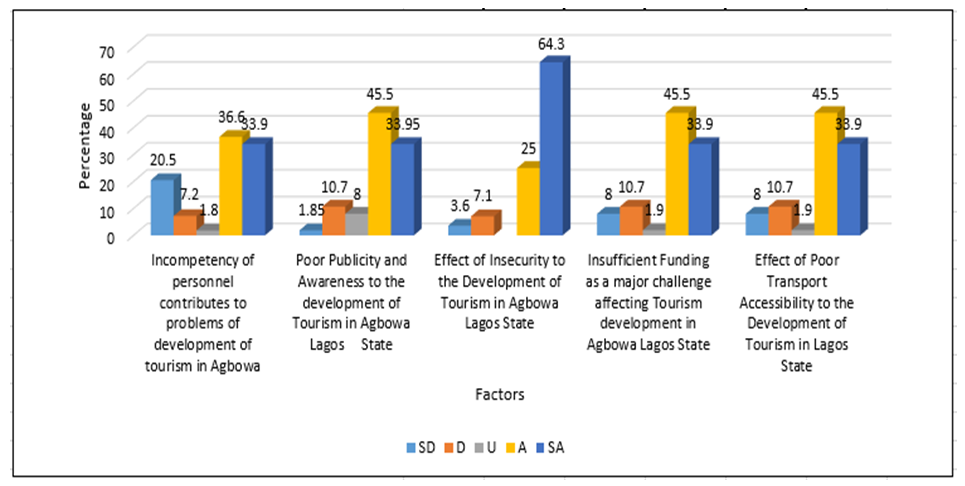 | Figure 2. Multiple bar chart showing key factors affecting sustainable tourism development in Agbowa |
5.2.1. Incompetency of Personnel Contributes to Problems of Development of Tourism in Agbowa
- Examining the extent at which incompetency of tourism personnel affect the development of tourism in Agbowa, Lagos State. The study reveals that most of the participants agreed that majority of the personnel working in the tourist centres are incompetent, accounting for 36.6%, while 33.9% of the respondents strongly agree and also 20.5% of the respondents strongly disagree stating that incompetency of the personnel does not hinder development of the centre. The study shows that only 7.2% of the participants disagree and 1.8% of them were undecided about the subject matter.
5.2.2. Poor Publicity and Awareness to the Development of Tourism in Agbowa Lagos State
- Effort was made also to discover the extent at which poor publicity/awareness affects tourism development. 45.5% of the respondents agreed to poor publicity and awareness, while 33.95% of the participants strongly agreed. On the other hand, only 10.7% of them disagree, while 8.0% were undecided. This however shows that with awareness and publicity of tourism industry in Agbowa Lagos State, the sector is more viable and sustainable.
5.2.3. Effect of Insecurity to the Development of Tourism in Agbowa Lagos State
- Insecurity was identified as one of the major problems against the development of tourism in Agbowa Lagos state. Examining the extent at which it affects the development of tourism, the study found out that majority of the respondents with 64.3% strongly agree while 25.0% of the respondents agree 7.1% of the respondents disagree while 3.6% of the respondents strongly disagree. The study shows that insecurity affects tourism development in Agbowa.
5.2.4. Insufficient Funding as a Major Challenge Affecting Tourism Development in Agbowa Lagos State
- The study shows that insufficient financing of tourism in Agbowa Lagos State affect the development of tourism in Agbowa. Majority of the respondent with 45.5% agreed that insufficient fund has hampered tourism development in Agbowa while 33.9% strongly agreed, 10.7% disagree and 8.0% strongly disagreed and 1.9% was undecided about the subject matter. The study shows that for the tourist centers in Agbowa to be viable and sustainable, it must be adequately funded.
5.2.5. Effect of Poor Transport Accessibility to the Development of Tourism in Lagos State
- Examining the extent of the effect of poor transport networks to the development of tourism in Agbowa, Lagos State, analysis shows that 45.5% of the respondents agreed that poor transport network affects the development of tourism in Agbowa. Also, 33.9% of the respondents strongly agreed while 10.7% of the respondents disagree and 8.0% of the respondents strongly disagreed and 1.9% of the respondents were undecided on the subject matter. It can be deduced from the study that poor road network and accessibility affects tourism development in the study area.
5.3. Proffered Solutions based on Respondents
|
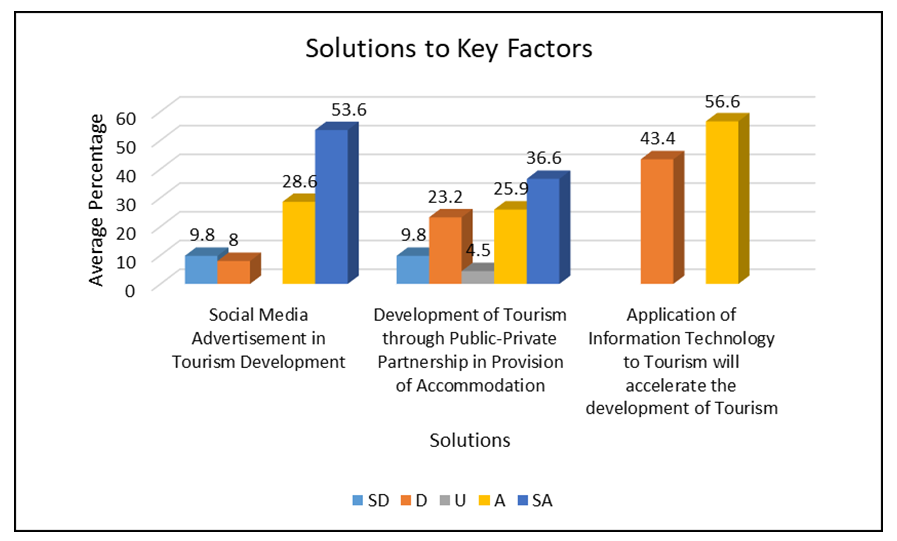 | Figure 3. Solutions to Key Factors Affecting Sustainable Tourism Development in Agbowa |
5.3.1. Social Media Advertisement in Tourism Development
- Social media is an increasing ways of publicizing products and services in contemporary time. Examining the possibilities of its adoption to increase awareness of tourism, the study shows that 53.6% of the respondents strongly agreed that social media can help to increase awareness. However, 28.6% of the respondents agreed with the use of social media as a tool for awareness while 9.8% strongly disagreed and 8.0% disagreed. Importance can therefore be attached for harnessing social media as a veritable medium for creating publicity/awareness of tourism in the study area.
5.3.2. Development of Tourism through Public-Private Partnership in Provision of Accommodation
- The study revealed majority of the respondents with 36.6% strongly agreed that development of tourism through public-private partnership in provision of accommodation, while 25.9% of the respondents agreed. Also, 23.2% of the respondents disagree on the subject matters while 9.8% of the respondents strongly disagreed and 4.5% of the respondents were undecided. The study thereby concludes that most participants strongly believe that public private partnership will enhance development.
5.3.3. Application of Information Technology to Tourism will Accelerate the Development of Tourism
- Examining the role of information technology in the development of tourism in Agbowa, Lagos state, the analysis shows that 56.6% of the respondents agreed that information technology will improve tourism in Agbowa, Lagos state, while 43.4% of the respondents disagreed. This shows that information technology can be of great impact to tourism development in Agbowa, Lagos state.
6. Policy and Planning Implication of Findings
- It is important to note that the findings emanating from this study has both policy and planning implications on tourism development in the study area and the nation at large. Nigeria being a developing economy needs to engage in contemporary discourse as it’s relate to tourism sustainability and its deliverables. Presently, the expected deliverables in tourism industry are currently not on ground in the country and does not comply with international best practices. Hence, deliberate policy must be made to harness the deliverables in tourism industry. In other words, the policy focus so far exhibited as a country has little or no significance on tourism development and sustainability. By implication, there is need for an urgent redirection and deliberate planning process that will enhance sustainable tourism industry. For example, the drive to promote policy that will encourage public – private handshake must be pursued vigorously. And such policy should be an integrated model that will embrace bottom-top approach.
7. Conclusions and Recommendations
- In conclusion the study believes that with the private and public sector handshakes, the provision of enabling environment for achieving the SDGs targeted at sustainable tourism in Agbowa township of Ikorodu, Lagos State, Nigeria, and the major dilemma to sustainable tourism development in Agboawa is the fear of insecurity. Recommendations from the study include the need to encourage public private partnership; deployment of social media to increase publicity and awareness; improve security and safety provision of good accommodation and improved multimodal means of transportation.
 Abstract
Abstract Reference
Reference Full-Text PDF
Full-Text PDF Full-text HTML
Full-text HTML